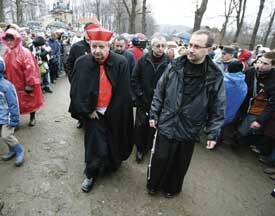During a major address at an international conference in Krakow, Cardinal Stanislaw Dziwisz, archbishop of Krakow and former personal secretary of John Paul II, assessed how far the Jewish-Catholic dialogue has progressed in the past half-century and where future dialogue partners in Jewish-Catholic relations might direct their efforts. “I have come here to thank you for your continuing and courageous following of the hard path of dialogue,” Dziwisz told the conference participants on March 6. “It is also to assure you how much I personally share your desire that the relations between Christians and Jews become increasingly fruitful as befits the children of One Father, the God of Abraham, Isaac and Jacob.”
Cardinal Dziwisz emphasized his own determination to build on the progress in Jewish-Christian relations that took place during John Paul II’s pontificate: “It was not by pure chance that a Polish pope, the pope from Krakow, has done so much for the cause of rapprochement and reconciliation between Christians and Jews.” Cardinal Dziwisz reflected on Krakow’s complex history of relations between Catholics and Jews, which included long periods of religious tolerance as well as episodes of persecution and bigotry, and which was marked in the 20th century by “increasingly darker colors.” By cherishing its traditions of pluralism and its historical embrace of diversity and dialogue with intermingled cultures, Dziwisz noted, modern Poland can affirm John Paul’s vision of Polish identity, and Poles can be “guardians of memory” of the Holocaust and agents of continuing reconciliation.
“The turnabout in Christian-Jewish relations which occurred after the [Second Vatican] Council was partly a response to the shock that humanity was going through in the 20th century, becoming aware of the vast extent of suffering which can be brought about by prejudices and hatred of other people,” Dziwisz commented. “Aware of this, the church wants more profound transformation of the minds and hearts of its sons and daughters with regard to their attitude toward Jews—the transformation at the level of theology and religious instruction, at local churches, and in each parish.” Efforts toward this transformation, Dziwisz noted, will include frequent meetings between Polish youth and Jewish pilgrims, many of whom come to visit Jewish martyrdom sites in Poland. The church in Poland, Dziwisz promised, “wants to do everything possible” to achieve “a full development of this brotherhood of Christians and Jews recently found anew.”
Cardinal Dziwisz called upon all his dialogue partners to renew their efforts and appealed to the international community for assistance. “In all these efforts undertaken in hope for full reconciliation we feel a strong need for support from the Jewish side. Keeping in mind the enormous numerical disproportion between our communities, Polish Christians, and Polish Jews, we place our hopes even more on the commitment to the dialogue by the representatives of Jewish communities from Israel and the United States.”
A number of prominent figures in Jewish-Christian relations participated in the conference, which was held at the Jesuit Center for Culture and Dialogue.








